用现在进行时表示将来
- 格式:ppt
- 大小:863.50 KB
- 文档页数:32
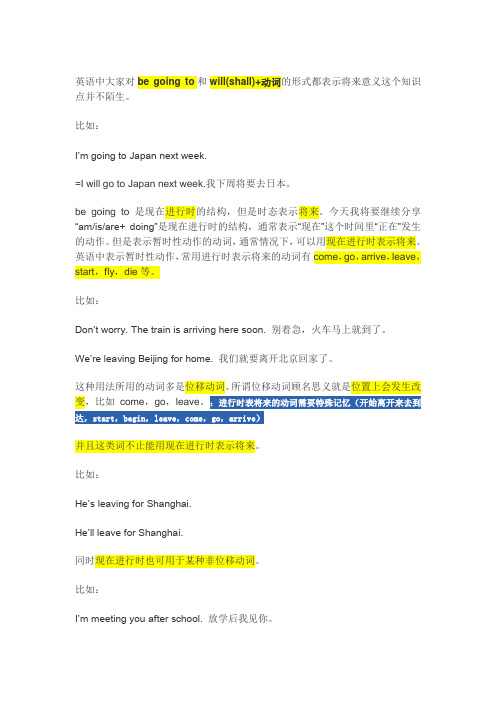
英语中大家对be going to和will(shall)+动词的形式都表示将来意义这个知识点并不陌生。
比如:I’m going to Japan next week.=I will go to Japan next week.我下周将要去日本。
be going to是现在进行时的结构,但是时态表示将来。
今天我将要继续分享“am/is/are+ doing”是现在进行时的结构,通常表示“现在”这个时间里“正在”发生的动作。
但是表示暂时性动作的动词,通常情况下,可以用现在进行时表示将来。
英语中表示暂时性动作,常用进行时表示将来的动词有come,go,arrive,leave,start,fly,die等。
比如:Don’t worry. The train is arriving here soon. 别着急,火车马上就到了。
We’re leaving Beijing for home. 我们就要离开北京回家了。
这种用法所用的动词多是位移动词。
所谓位移动词顾名思义就是位置上会发生改变,比如come,go,leave。
并且这类词不止能用现在进行时表示将来。
比如:He’s leaving for Shanghai.He’ll leave for Shanghai.同时现在进行时也可用于某种非位移动词。
比如:I’m meeting you after school. 放学后我见你。
What are you doing next Sunday?下星期天你要干什么?初中阶段用现在进行时表将来的位移动词和非位移动词汇总如下,同学们可特殊记忆。
接下来我们看一道现在进行时表将来的易错题:The engineer is returning from Hong Kong _____ a few days.A. sinceB. forC. inD. after很多同学一看选D,正确答案C。
解析:is returning是现在进行时表示将来。

现在进行时表示将来现在进行时表示将来,主要用于表示按计划或安排要发生的动作。
常有“意图”“安排”或“打算”的含义。
这种现在进行时比较生动,给人一种期待感。
它常表最近或较近的将来,所用动词多是转移动词。
表将来的现在进行时除用于转移动词外,亦可用于某些非转移动词。
能这样用的动词常用的有:arrive, come, do, get, go, have, leave, meet, play, return, see, spend, start, stay, wear, work 等。
如:I’m leavi ng tomorrow. 我明天走。
They’re getting married next month. 他们下个月结婚。
Are you meeting Bill this evening? 你今晚将和比尔见面吗?1) come, go, stay, arrive, leave 等词的现在进行时经常用来表示将来确切的计划。
2) 表示交通方式、行程安排的动词,例如fly,walk, ride, drive, take(a bus, a taxi)等的现在进行时也经常用于表示将来。
如:但偶尔也表示较远的将来。
如:When I grow up, I’m joining the army. 我长大了要参军。
3)表将来的现在进行时有时含有“决心”的意思,多用在否定结构中。
如:I’m not going. 我不走了。
I’m not waiting any longer. 我不再等了。
有时也用在肯定结构中。
如:I’m backing out. 我要打退堂鼓了。
4)用这种现在进行时与对方讲话时可变成命令,不过语气比较温和。
如:You are staying. 你留下吧。
Don’t forget: you are taking part too. 不要忘记:你也要参加。
5)现在进行时也可在时间、条件或原因状语从句中表示将来。

现在进行时表示将来时的用法
现在进行时通常表示正在进行的动作或状态,但在某些情况下,它也
可以表示将来时。
这种用法通常用于以下情况:1. 安排或计划的未来活
动例如:- I am meeting my friend tomorrow.
- They are flying to Paris next week.2. 一种即将发生的趋势或
趋势例如:- The weather is getting colder. (天气即将变冷)。
- The economy is improving. (经济即将好转)3. 表示不确定的未
来计划或意图例如:- I am thinking of going to the gym later. (我
正在考虑晚些时候去健身房)。
- She is considering taking a break from work. (她正在考虑休
息一下)需要注意的是,现在进行时表示将来时的用法通常与时间状语一
起使用,以明确表示将来的时间。
例如,上面的例子中,明确指出了明天、下周等时间。
总之,现在进行时表示将来时的用法并不常见,但在某些情
况下是有用的。
需要根据具体语境来判断是否适用。

现在进行时表将来,主要表示按计划或安排要发生的动作:I’m leaving tomorrow. 我明天走。
They’re getting married next month. 他们下个月结婚用现在进行时表示将来,其计划性较强,并往往暗示一种意图;go,come,arrive,reach,leave等表方向运动的动词才可以用来表将来,其余此形式仍表示现在进行时现在进行时表示将来的句子的谓语动词主要有下列三种:(1)现在进行时表示将来的句子的谓语动词绝大多数是位移动词,这样的动词有arrive,come,drive,fly,go,leave,travel等。
如:I’m going home tonight. 我今晚回家。
We’re leaving for Changsha tomorrow. 我们明天就去长沙。
(2)表示位置的动词如stay,remain和动词do与have(吃、喝)。
如:——What are you doing next Saturday?下星期六你准备做什么?——I’m staying at home.我将呆在家里。
——What are you doing this evening? 今天晚上你准备做什么?——I’m having dinner at home with my families.我要与我的家人在家共进晚餐。
(3)一些其它动词。
如:My mother is buying me a dictionary soon.我妈妈不久将给我买一本词典。
I’m meeting you after school. 放学后我要找你。
这种表示将来的用法不能用通常没有进行时的动词,它们只能用其它方式表示将来。
这样的动词有:(1)表示状态的be动词。
(2)感官动词feel, hear, smell, see等。
(3)表示思想状态的如believe, forget, know, remember等动词。
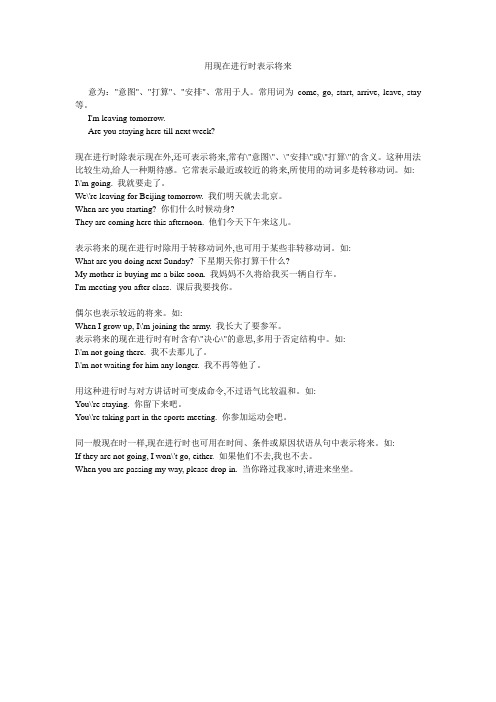
用现在进行时表示将来意为:"意图"、"打算"、"安排"、常用于人。
常用词为come, go, start, arrive, leave, stay 等。
I'm leaving tomorrow.Are you staying here till next week?现在进行时除表示现在外,还可表示将来,常有\"意图\"、\"安排\"或\"打算\"的含义。
这种用法比较生动,给人一种期待感。
它常表示最近或较近的将来,所使用的动词多是转移动词。
如: I\'m going. 我就要走了。
We\'re leaving for Beijing tomorrow. 我们明天就去北京。
When are you starting? 你们什么时候动身?They are coming here this afternoon. 他们今天下午来这儿。
表示将来的现在进行时除用于转移动词外,也可用于某些非转移动词。
如:What are you doing next Sunday? 下星期天你打算干什么?My mother is buying me a bike soon. 我妈妈不久将给我买一辆自行车。
I'm meeting you after class. 课后我要找你。
偶尔也表示较远的将来。
如:When I grow up, I\'m joining the army. 我长大了要参军。
表示将来的现在进行时有时含有\"决心\"的意思,多用于否定结构中。
如:I\'m not going there. 我不去那儿了。
I\'m not waiting for him any longer. 我不再等他了。
用这种进行时与对方讲话时可变成命令,不过语气比较温和。

现在进行时表示将来现在进行时表示将来,主要用于表示按计划或安排要发生的动作。
常有“意图”“安排”或“打算”的含义。
这种现在进行时比较生动,给人一种期待感。
它常表最近或较近的将来,所用动词多是转移动词。
表将来的现在进行时除用于转移动词外,亦可用于某些非转移动词。
能这样用的动词常用的有:arrive, come, do, get, go, have, leave, meet, play, return, see, spend, start, stay, wear, work 等。
如:I’m leaving tomorrow. 我明天走。
They’re getting married next month. 他们下个月结婚。
Are you meeting Bill this evening? 你今晚将和比尔见面吗?1) come, go, stay, arrive, leave 等词的现在进行时经常用来表示将来确切的计划。
2) 表示交通方式、行程安排的动词,例如fly,walk, ride, drive, take(a bus, a taxi)等的现在进行时也经常用于表示将来。
如:但偶尔也表示较远的将来。
如:When I grow up, I’m joining the army. 我长大了要参军。
3)表将来的现在进行时有时含有“决心”的意思,多用在否定结构中。
如:I’m not going. 我不走了。
I’m not waiting any longer. 我不再等了。
有时也用在肯定结构中。
如:I’m backing out. 我要打退堂鼓了。
4)用这种现在进行时与对方讲话时可变成命令,不过语气比较温和。
如:You are staying. 你留下吧。
Don’t forget: you are taking part too. 不要忘记:你也要参加。
5)现在进行时也可在时间、条件或原因状语从句中表示将来。
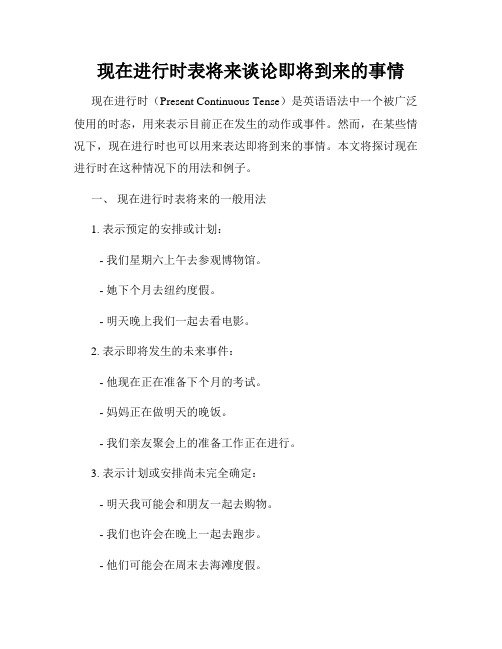
现在进行时表将来谈论即将到来的事情现在进行时(Present Continuous Tense)是英语语法中一个被广泛使用的时态,用来表示目前正在发生的动作或事件。
然而,在某些情况下,现在进行时也可以用来表达即将到来的事情。
本文将探讨现在进行时在这种情况下的用法和例子。
一、现在进行时表将来的一般用法1. 表示预定的安排或计划:- 我们星期六上午去参观博物馆。
- 她下个月去纽约度假。
- 明天晚上我们一起去看电影。
2. 表示即将发生的未来事件:- 他现在正在准备下个月的考试。
- 妈妈正在做明天的晚饭。
- 我们亲友聚会上的准备工作正在进行。
3. 表示计划或安排尚未完全确定:- 明天我可能会和朋友一起去购物。
- 我们也许会在晚上一起去跑步。
- 他们可能会在周末去海滩度假。
二、现在进行时表将来的其他特殊用法1. 表示不断重复发生的未来事件:- 每天早上七点,他都在打扫房间。
- 下个星期五,他们将在这里进行例会。
- 每个月的最后一天,我都在检查账目。
2. 表示不确定的未来活动:- 我的车子坏了,所以我得找个修理厂修理它。
- 我的电话没电了,我必须找个地方充电。
- 他的电脑崩溃了,所以他得去修理它。
3. 表示计划或安排已经做出但未来有可能改变:- 明天下大雨,但情况还可能改变。
- 我们本计划明天去远足,但天气不好。
- 明天的飞机延误了,但很可能会换班次。
三、现在进行时表将来时的时间状语词在使用现在进行时表达将来的时候,通常会与一些表示未来的时间状语词一起使用,如下所示:- 下周- 下个月- 明天- 本周末- 一会儿- 马上- 不久后- 在未来例如:- 我们马上要参加一个重要的会议。
- 我们下周计划去度假。
- 我将在几分钟内给你寄一封邮件。
四、现在进行时与其他将来时态的区别尽管现在进行时有时可用于表达将来的事件,但它与其他将来时态(如一般将来时)还是有一些区别的。
1. 现在进行时:表示未来正计划或安排要做的事情。

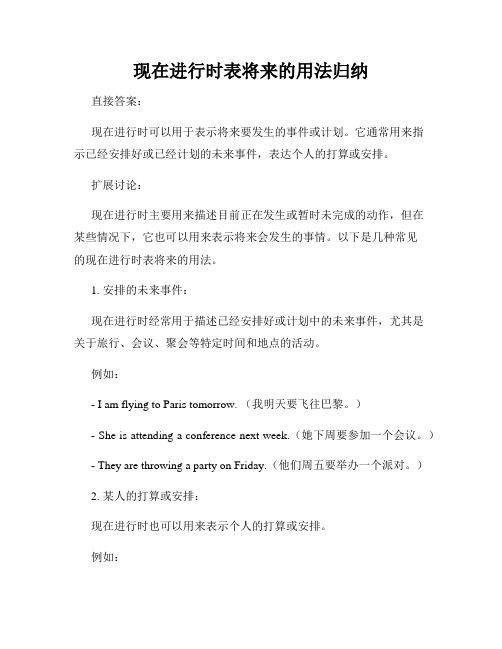
现在进行时表将来的用法归纳直接答案:现在进行时可以用于表示将来要发生的事件或计划。
它通常用来指示已经安排好或已经计划的未来事件,表达个人的打算或安排。
扩展讨论:现在进行时主要用来描述目前正在发生或暂时未完成的动作,但在某些情况下,它也可以用来表示将来会发生的事情。
以下是几种常见的现在进行时表将来的用法。
1. 安排的未来事件:现在进行时经常用于描述已经安排好或计划中的未来事件,尤其是关于旅行、会议、聚会等特定时间和地点的活动。
例如:- I am flying to Paris tomorrow. (我明天要飞往巴黎。
)- She is attending a conference next week.(她下周要参加一个会议。
)- They are throwing a party on Friday.(他们周五要举办一个派对。
)2. 某人的打算或安排:现在进行时也可以用来表示个人的打算或安排。
例如:- I am meeting John for lunch later.(我等一下要和约翰吃午饭。
)- We are going to the movies tonight.(我们今晚要去看电影。
)- He is studying for his exam tomorrow.(他正在为明天的考试复习。
)3. 临时的决定或走向:现在进行时有时也可以用来表示临时的决定或走向,即在说话时没有提前计划或安排,但现在正在发生的事情。
例如:- I am starting a new project next week.(我下周要开始一个新项目。
)- They are moving to a new city next month.(他们下个月要搬到一个新城市。
)- The company is expanding their business overseas.(公司正在扩大海外业务。
)需要注意的是,现在进行时表将来的用法并不是所有动作都适用。

现在进行时表将来的用法
现在进行时表将来的用法
“现在进行时可以表示将来的动作或情况”,这种说法既准确又带有一定的深意。
它是描述当前发生的事情,也可以用来描述未来的动作和情况。
因此,在表达未来的计划和愿望时,可以使用现在进行时。
现在进行时用于表示将来的情况或动作,主要是强调未来动作或情况对当前状况的影响,以及将来的动作或情况是可预见的。
例如:明年我们将会有一个新的大学生来访,我们正在准备这个活动。
这句话是表示将来的情况,但采用的是现在进行时的形式,表明我们打算用这种方式去准备这个活动,而不是把它作为将来可能发生的事情。
此外,现在进行时也可以用来表达对未来的愿望。
比如:我正在考虑要去那里度假,这句话既表明未来要去那里度假,也表示我们正在考虑这个问题。
此外,现在进行时也可以用来表达未来的计划,比如:我们正在准备明天的派对。
总之,现在进行时可以用来表达将来的动作或情况,它可以表明将来的动作或情况是可预见的,并且也可以用来表达未来的愿望和计划。
只要我们正确地使用这种语法,就可以更加准确地表达我们的想法和愿望。

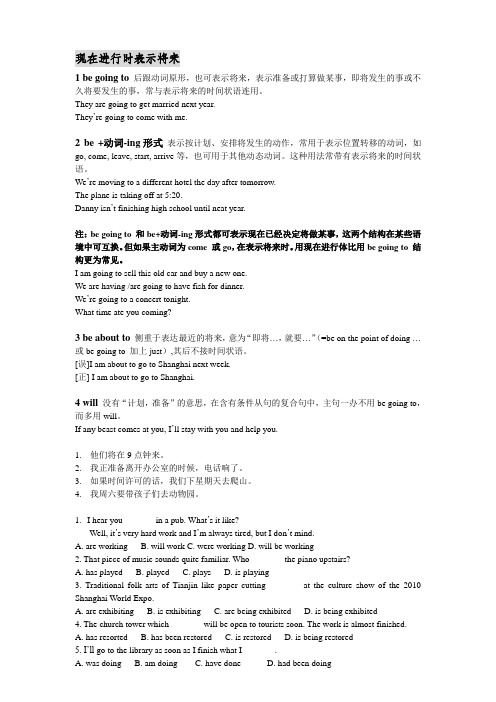
现在进行时表示将来1 be going to后跟动词原形,也可表示将来,表示准备或打算做某事,即将发生的事或不久将要发生的事,常与表示将来的时间状语连用。
They are going to get married next year.They’re going to come with me.2 be +动词-ing形式表示按计划、安排将发生的动作,常用于表示位置转移的动词,如go, come, leave, start, arrive等,也可用于其他动态动词。
这种用法常带有表示将来的时间状语。
We’re moving to a different hotel the day after tomorrow.The plane is taking off at 5:20.Danny isn’t finishing high school until neat year.注:be going to 和be+动词-ing形式都可表示现在已经决定将做某事,这两个结构在某些语境中可互换。
但如果主动词为come 或go,在表示将来时。
用现在进行体比用be going to 结构更为常见。
I am going to sell this old car and buy a new one.We are having /are going to have fish for dinner.We’re going to a concert tonight.What time ate you coming?3 be about to侧重于表达最近的将来,意为“即将…,就要…”(=be on the point of doing …或be going to 加上just),其后不接时间状语。
[误]I am about to go to Shanghai next week.[正] I am about to go to Shanghai.4 will没有“计划,准备”的意思,在含有条件从句的复合句中,主句一办不用be going to,而多用will。

现在进行时表将来引言在英语语法中,现在进行时表示正在进行的动作,通常用于表达现在正在发生的事情。
然而,有时现在进行时也可以用来表示将来发生的事件。
本文将会详细介绍如何使用现在进行时来表达将来。
使用现在进行时表将来一般来说,现在进行时主要用于描述现在正在进行的动作,如:•The children are playing in the park.(孩子们正在公园里玩耍。
)•He is studying for his exams.(他正在为考试学习。
)然而,有时我们也可以使用现在进行时来表达将来时间,特别是当我们想要强调已经被计划或安排的事情。
以下是一些使用现在进行时表达将来的情况:1. 已安排的计划或约定如果我们事先安排了某个动作或约定了一个会面,可以使用现在进行时来表示将来的动作或事件。
例如:•I am meeting my friends for dinner tonight.(我今晚要和朋友们吃晚饭。
)•They are flying to Paris next month.(他们下个月要飞往巴黎。
)2. 种类为“固定安排”的动作“固定安排”指的是按照某种规律或习惯性地重复出现的动作。
在这种情况下,我们也可以使用现在进行时来表达将来。
例如:•We are leaving for the airport at 9 AM tomorrow.(我们明天上午9点出发去机场。
)•The train is arriving in five minutes.(火车将在五分钟后到达。
)3. 表示临时决定或意图有时,当我们做出临时决定或者表示当前的意图时,也可以使用现在进行时来表示将来。
例如:•I am taking a break this afternoon.(今天下午我要休息一下。
)•We are going to see a movie tonight.(我们今晚要去看电影。
)以上是使用现在进行时表达将来的一些常见情况,但并不是唯一的用法。
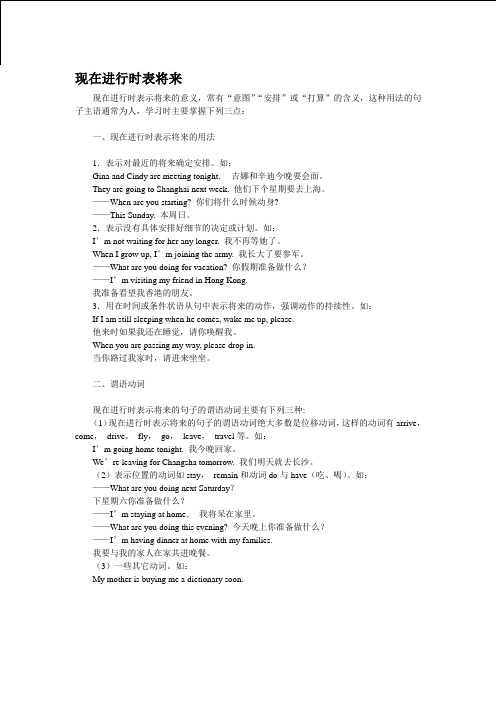
现在进行时表将来现在进行时表示将来的意义,常有“意图”“安排”或“打算”的含义,这种用法的句子主语通常为人,学习时主要掌握下列三点:一、现在进行时表示将来的用法1.表示对最近的将来确定安排。
如:Gina and Cindy are meeting tonight.吉娜和辛迪今晚要会面。
They are going to Shanghai next week. 他们下个星期要去上海。
——When are you starting? 你们将什么时候动身?——This Sunday. 本周日。
2.表示没有具体安排好细节的决定或计划。
如:I’m not waiting for her any longer. 我不再等她了。
When I grow up, I’m joining the army. 我长大了要参军。
——What are you doing for vacation? 你假期准备做什么?——I’m visiting my friend in Hong Kong.我准备看望我香港的朋友。
3.用在时间或条件状语从句中表示将来的动作,强调动作的持续性。
如:If I am still sleeping when he comes, wake me up, please.他来时如果我还在睡觉,请你唤醒我。
When you are passing my way, please drop in.当你路过我家时,请进来坐坐。
二、谓语动词现在进行时表示将来的句子的谓语动词主要有下列三种:(1)现在进行时表示将来的句子的谓语动词绝大多数是位移动词,这样的动词有arrive,come,drive,fly,go,leave,travel等。
如:I’m going home tonight. 我今晚回家。
We’re leaving for Changsha tomorrow. 我们明天就去长沙。
(2)表示位置的动词如stay,remain和动词do与have(吃、喝)。
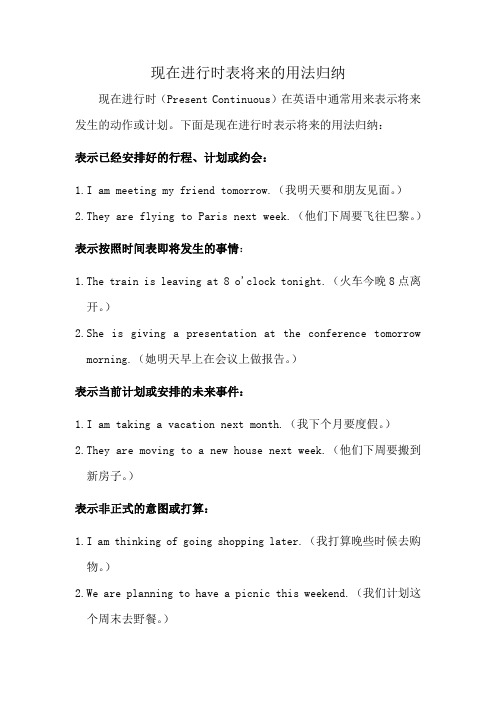
现在进行时表将来的用法归纳现在进行时(Present Continuous)在英语中通常用来表示将来发生的动作或计划。
下面是现在进行时表示将来的用法归纳:表示已经安排好的行程、计划或约会:1.I am meeting my friend tomorrow.(我明天要和朋友见面。
)2.They are flying to Paris next week.(他们下周要飞往巴黎。
)表示按照时间表即将发生的事情:1.The train is leaving at 8 o'clock tonight.(火车今晚8点离开。
)2.She is giving a presentation at the conference tomorrow morning.(她明天早上在会议上做报告。
)表示当前计划或安排的未来事件:1.I am taking a vacation next month.(我下个月要度假。
)2.They are moving to a new house next week.(他们下周要搬到新房子。
)表示非正式的意图或打算:1.I am thinking of going shopping later.(我打算晚些时候去购物。
)2.We are planning to have a picnic this weekend.(我们计划这个周末去野餐。
)需要注意的是,现在进行时表示将来时,通常应有明确的时间状语、上下文或其他线索来表明动作发生的时间是在未来。
另外,有些动词(如arrive、leave、start等)在表示将来时时常用现在进行时,而不是一般将来时形式。
例如:1.They are leaving for the airport at 6 p.m.(他们将于下午6点离开去机场。
)2.She is starting her new job next Monday.(她下周一开始新工作。

现在进行时表将来
现在进行时表将来
现在进行时是英语中的一种时态,用来描述目前正在发生或进行
的动作。
然而,有时候也可以用现在进行时来表示将来要发生的动作。
在这篇文章中,我们将探讨现在进行时表达将来时态的用法。
1. 表示预定的未来安排
现在进行时可以用来描述预定的未来安排或计划。
例如:
- 我们明天晚上在家吃饭。
- 下个月我要去欧洲旅行。
- 明天这个时间我将在开会。
2. 表示近期计划或打算
现在进行时也可以用来表示近期计划或打算。
例如:
- 我们这周末要去看电影。
- 我今天晚上要和朋友们出去玩。
- 下个月他们准备搬到新的公寓。
3. 表示不可避免的未来事件
有时,现在进行时还可以用来表示不可避免的未来事件。
例如:
- 明天将会下雨。
- 这个夏天我们会经历很热的天气。
- 等下一个星期,我会很忙。
需要注意的是,现在进行时表示将来时态的情况并不常见,更多
的时候我们会使用其他时态来表达将来的动作。
然而,在特定的语境下,现在进行时也是可以使用的。
总结:
- 现在进行时可以用来表示预定的未来安排,近期计划或打算,以及
不可避免的未来事件。
- 尽管不常见,但在特定的语境下也可以使用现在进行时来表达将来
时态。
简而言之,尽管现在进行时不是常见的将来时态的表达方式,但在特定场合下可以这样使用。
掌握这一用法能够帮助我们更好地理解和运用英语语法。

用现在进行时表示将来: 当句子涉及确切的计划、明确的意图和为将来安排好的活动时, 现在进行时可用于表示将来。
1) come, go, stay, arrive, leave 等词的现在进行时经常用于表示将来确切的计划。
2) 表示交通方式、行程安排的动词,例如fly, walk, ride, drive, take (a bus, a taxi)等的现在进行时也经常用于表示将来。
注意: 英语中一些表“状态和感官”的动词通常不用于进行时:表存在或位置: be, lie, stand: Japan lies to the east of China.表所属: have, own, possess, belong to, fit, suit : Taiwan belongs to China.表知觉: see, hear, smell, taste, sound, look, feel, seem, appearI smell the dinner cooking. He seems quite happy.表认识、信仰、意见、怀疑、猜测、希望: know, think, understand, doubt, suppose, hope, wish He doubts whether you will find your lost pen again.表喜欢、反对、仇恨、厌恶: love, like, prefer, mind, hate, want, dislike, envyWe love our motherland deeply.1、Betty ________ (leave) for Guangzhou by plane at 3:00 this afternoon. Her brother Bob ________ (see) her off. It’s half past one now. They __________ (wait) for a taxi outside the school gate.2、The Browns ________ (go) to the North China by train next week. They __________ (stay) in Beijing for a week. They ________ (go) to Xi’an. They __________ (get) there by air.3、Some friends _________ (come) to Anne’s birthday party this evening. Anne’s mother __ (be) busy ______ (get) ready for the birthday dinner. Anne _________ (help) her mother now.注意!另外,表示将来的动作或状态,还可用以下几种形式:①will / shall+动词原形I shall be seventeen years old next month.②be going to+动词原形:表示即将发生的或最近打算进行的事。
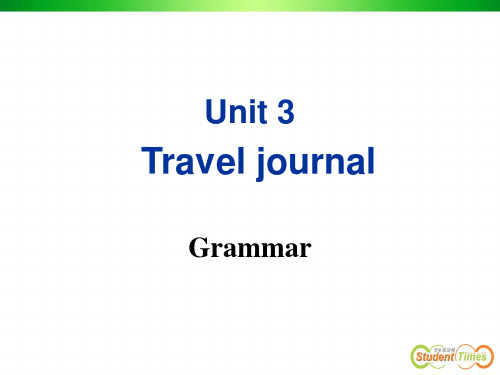


现在进行时表将来的用法现在进行时表将来的动作,谓语通常为瞬间动词。
如:come, go, arrive, leave, start, return, stay, meet, get等。
这些动词的进行时后不能再接具体的时间。
一、用现在进行时表示将来,指的是近期的,按计划或安排要发生的动作。
二、现在进行时表示将来与表示正在进行的动作的区别在于:前者通常用瞬间动词(有时一些常用动词也可以这样用如:do)如:go, come, start, return, get, arrive等。
而后者通常是持续性动词。
He is reading a novel. 他在看小说。
The train is arriving soon. 火车就要进站了。
三、用现在进行时表示将来的时间,在句中或上下文中通常有表示将来时间的状语。
四、现在进行时与一般现在时表示将来动作的区别在于:前者表示的将来的动作往往是可以改变的,而后者则是根据规定或时间表预计要发生的动作或事情,因此往往是不可改变或不可随便改变的。
What are you doing next Friday? 下星期五你们打算干什么?The plane takes off at 7︰30 tonight.飞机今晚七点半起飞。
用现在进行时表示将来当句子涉及确切的计划、明确的意图和为将来安排好的活动时, 现在进行时可用于表示将来。
1) come, go, stay, arrive, leave 等词的现在进行时经常用于表示将来确切的计划。
2) 表示交通方式、行程安排的动词,例如fly, walk, ride, drive, take (a bus, a taxi)等的现在进行时也经常用于表示将来。
练一练1.Betty ________ (leave) for Guangzhou by plane at 3:00 this afternoon. Her brother Bob ________ (see) her off. It’s half past one now. They __________ (wait) for a taxi outside the school gate.The Browns ________ (go) to the North China by train next week. They __________ (stay) in Beijing for a week. They ________ (go) to Xi’an. They __________ (get) there by air.Some friends _________ (come) to Anne’s birthday party this evening. Anne’s mother __ (be) busy ______ (get) ready for the birthday dinner. Anne _________ (help) her mother now.。